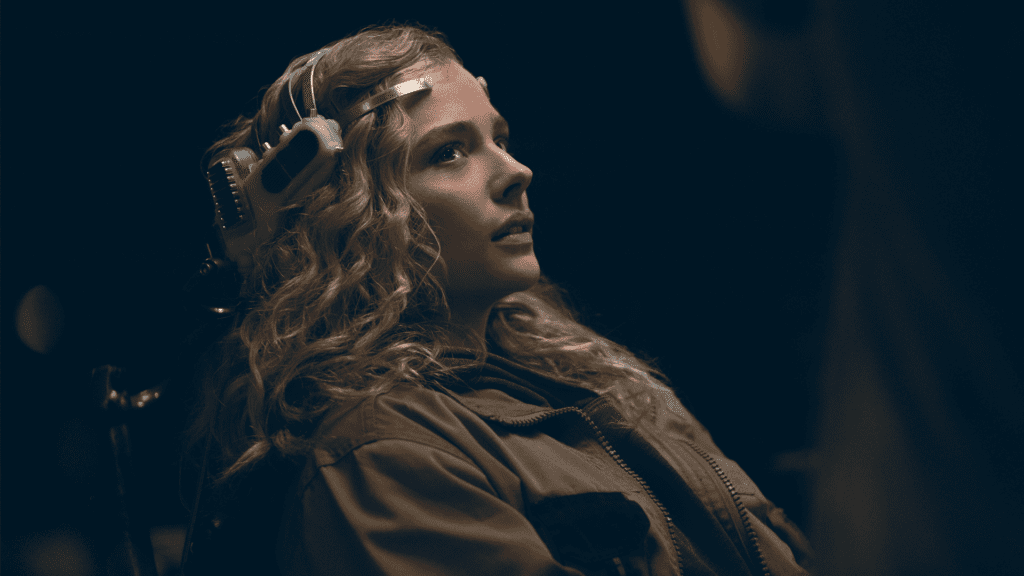In this article, we discuss the differences between the show and the book in The Peripheral season 1, and so it will contain spoilers.
Prime Video’s sci-fi series The Peripheral tells the story of a post-apocalyptic future where VR gaming has become scarily realistic and artificial intelligence is as run of the mill as the mobile phone in your pocket. This technologically advanced future is brought to life in a visually stunning eight-part series from creator Scott Smith and executive producers Jonathan Nolan and Lisa Joy (Westworld). But it is all originally from the mind of one author, William Gibson (Neuromancer), the pioneering sci-fi novelist, who coined the phrase cyberspace, no less.
Adapting any of Gibson’s stories has proved a near impossible task over the many decades since his debut novel, yet the Westworld creators have managed to pull off the improbable and made Gibson’s complex and jargon-heavy world into a believable reality. As with any adaptation, there are plot points and character arcs that need tweaking slightly or removing completely to adjust to the television format or for pacing purposes and The Peripheral is no different. So, let’s explore the many differences between the show and the book.
What are the differences between The Peripheral show and the book
The Premise
The initial premise stays pretty accurate to the one found in the book. Flynne and Burton live with their mother in rural America. Flynne (Chloe Grace Moretz) works at a 3D printing shop and her brother Burton (Jack Reynor) is a retired US Marine, making a living gaming in these super-authentic VR simulations. The haptic technology that linked him with his fellow soldiers in warfare is also similar, although Gibson doesn’t reveal the specifics behind this synchronizing tech until later in the novel, whilst the show explains haptics quite early on in the season, describing the synching up of minds to be a bit like falling in love. Burton gets hired by the suspicious Colombian company Milagros Coldiron and tests out their futuristic headset, but Flynne’s introduction to this world is slightly altered in the novel.
Meanwhile, the futuristic landscape of London, seventy years on from Flynne’s timeline, and the characters inhabiting that world, mainly Wilf, Aelita, and Lev, are all similar to the 2014 novel of the same name, to a certain degree, although Wilf’s character may be the biggest alteration from the novel, but we’ll discuss that later. Getting back to the premise, these two worlds combine, like in the series, as they find themselves all hunting for the same missing Aelita. In this sense, the major mystery of the series stays the same in both. Aelita and her many secrets are the overarching hook and the gateway to this sci-fi narrative.
Flynne’s Involvement
Like I’ve said, Flynne’s character starts off in the same vein, with the same job and the same passion for video gaming. However, her journey to the future London seen in the series is quite different. In the series, Burton asks Flynne to test out this simulated world and an unfamiliar headset, one without any VR goggles. Burton has been paid to trial run this simulated experience, but he knows the only real reason they’ve handpicked him is because of Flynne’s unparalleled talents. She was the one using Burton’s avatar in secret, building Burton an unbeatable score on his behalf. So she is the only rightful candidate and Burton gracefully accepts this, passing the task on to her.
In the book, Burton is a drone operator working security for the Colombian business Milagros Coldiron in a virtual world that looks vaguely similar to London. He leaves town to protest an extremist religious group known as Luke 4:5 and places Flynne in charge of his respected duties. Whilst performing her security obligations she witnesses a horrific murder and finds herself inadvertently linked to Aelita’s disappearance. Her drone footage may help them to uncover Aelita’s whereabouts, which is where Wilf enters the story.
Wilf’s Character
Played by Gary Carr (The Deuce), Wilf Netherton of the series is a (vaguely titled) fixer, who yearns to find his missing sister Aelita. They aren’t blood-related siblings, but via flashbacks, it is revealed that these best of friends had an unbreakable bond and were fostered together in this futuristic England. Wilf is a mysterious character, with his own secrets, but it is very clear that he is a good guy in the storyline, someone we can root for. He helps Flynne navigate this new, scary world and they even share a kiss and flirt. Wilf tries not to involve himself in Lev’s criminal activities but works with him out of necessity more than anything.
In the novel, Wilf is an entirely different character from the one portrayed in the series. William Gibson presents him as a charismatic alcoholic publicist working for a celebrity in the early 22nd century. His involvement with Flynne and her world takes a totally different route as does his relationship with the distrustful Lev.
Lev and the Bounty
As in the show, Lev is a descendant of a wealthy Russian family and has been tinkering with the past. Using his futuristic technology they can bring Flynne into their timeline, so she can be questioned about what she saw the night of Aelita’s disappearance. In the series, Wilf warns her of an imminent attack and pressures her to return to their world, whilst in the novel, an Inspector wants to question her about the man she witnessed during this fracas. Differences come to the same end.
The attack upon the Fisher household is very similar in both the book and the series though. Wilf warns Flynne and Burton that a bounty has been placed on their heads. Someone wants the Fisher family dead and they soon find themselves under attack. This exciting shoot-out works similarly in both instances and goes someway toward upping the stakes. It shows the Fishers that this is a reality, there are consequences to their actions and it also proves that Wilf is on their side. He wants to protect them from these assassination attempts.
The Jackpot and London, 2100
Finally, let’s address the futuristic landscape that makes for such a visually impressive cinematic treat on The Peripheral. Scott Smith has constructed a desolate future that is still recovering from an apocalyptic doomsday. In this future, the streets of London seem eerily quiet, with only the odd citizen and robot passing by, whilst giant Greek/Roman statues can be seen dotted about the cityscape. In the novel, London is described as pretty much the same as it has always been with structures known as shards peppered around the place. So not much difference there then.
Then there is the jackpot, a specific period of time that was seen as the end of the world. In the series, this is described as a combination of events that led to this declining population Flynne has subsequently noticed. There was famine, war, terrorism, climate change, and a pandemic to deal with. It was the perfect storm really, a slow and steady decay until the world was forever changed. This is very similar in the book, where 80 percent of the world’s population was killed off.
Conclusion
All in all, there were quite a few changes in the editing process from book to series. Fans of the novel may be disappointed with the way Gibson’s world and characters were altered on their journey to the big screen, yet the show also has its own loyal fan base already too. It’s all very similar to Prime Video’s The Lord of the Rings: The Rings of Power, except Gibson’s fans aren’t as vocal or prominent. Gibson has been described as an unadaptable writer at the best of times. His worlds are deeply mapped out and intricately complex affairs, which has caused no end of strife for screenwriters in the decades since and has made his opus Neuromancer nearly impossible to adapt. The Peripheral may be the most adaptable and accessible of his bibliography, but it still needed quite a large reworking.
The slight alterations to plot points and character arcs can be easily tolerated, it comes with the territory so to speak, but the complete rewriting of Wilf seems like an oversight. His charming alcoholic persona in a trashy celebrity world seemed like an interesting angle that has unfortunately been completely ignored in the Prime Video series to date. Hopefully, the show can find room to include this overlooked segment of the novel in future seasons.
Are there any more differences between The Peripheral show and the book? Let us know in the comments.



